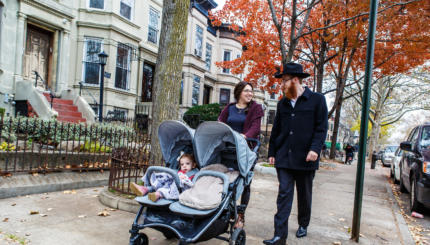Many of us have read some of the recent memoirs written by people who have left their Orthodox community of origin, usually in the Hareidi (ultra-Orthodox) segment. The stories told have offered insights into a world with which most of us are not intimately familiar, and they have been gripping but sad. Perhaps because I grew up in a Yeshivish community and some of my close relatives are Hasidic, I have found these memoirs to be intriguing, and was particularly intrigued by Shulem Deen’s, “All Who Go Do Not Return.”
But I was also aware that our understanding of this group was anecdotal at best, and we all know that the plural of “anecdote” is not “data.” I had just started a market research firm focusing on the Jewish community, so I took a shot at Facebook messaging Shulem, who met me for lunch and found my idea of a formal, quantified survey of OTDers to be a very interesting idea. Our goal in considering such a survey was simple: we want to give these people – extending it from the Hareidi to the Modern Orthodox community – a voice, and to allow their coreligionists to listen.
To make a long story short, the enthusiasm built for conducting this type of pioneering study, and we ended up getting close to 900 responses from 31 states and 11 countries, covering the Orthodox spectrum. The full results of the survey (“Starting a Conversation: A Pioneering Survey of Those Who Have Left the Orthodox Community”) are publicly available at http://nishmaresearch.com/social-research.html, and we’ll be discussing the findings at a JOFA webinar on Tuesday evening, August 16 at 8:00 pm EDT.
Click to register for the JOFA webinar and access the live stream next Tuesday night.
Here are just a few of the interesting findings:
- More people feel they have been “PUSHED Off the Derech,” rather than “PULLED Off the Derech.” Asked why they left, more people cited internal conditions – such as the status of women, perceptions of hypocrisy – that pushed them out, than cited reasons related to the lure of the outside world.
- It’s hard to keep the outside world at bay; but the Internet is not cited as a significant factor. Outside knowledge – obtained by reading, personal interactions or otherwise learning things (science, philosophy, Biblical criticism, etc.) that contradicted prior beliefs – has been influential. And while the Haredi community is fearful of the danger of the Internet, only 2% named it as a factor in why they left.
- The status of women is a significant factor. The status of women was among the most widely cited reasons for leaving Orthodoxy. It was the top reason among Modern Orthodox and the top reason among all women. Indeed, among Modern Orthodox women, 37% cited this as a reason why they left Orthodoxy.
- Weak secular education is not a major reason for leaving. While there has been some criticism of the weak secular education in Haredi communities, only 2% mentioned it as a reason why they left.
- Almost all remain Jewish … as they define it. 95% view themselves as Jewish, with the majority (60%) labeling themselves as culturally Jewish, traditional, secular/humanist Jewish or “just Jewish.” Very few labeled themselves as belonging to any of the typical Jewish world denominations.
- But are they Jewish in practice? While few (21%) said they believe in God, the percentages that said they keep kosher (31%), light Sabbath candles (53%), have a sense of belonging to the Jewish people (61%) or an attachment to Israel (66%) are comparable to the percentages among all U.S. Jews.
- The formerly Modern Orthodox retain more traditional practices and beliefs than the formerly Haredi. For example, 78% of the formerly Modern Orthodox said being Jewish is important to them, compared to 57% of the formerly Haredi, and this discrepancy appeared across a range of practices and beliefs.
- While there is widespread rejection by families, there is also some growing acceptance over time. Respondents stated that most of their families do not understand their decisions in leaving Orthodoxy. But the percentage of family that understands grew from 15% when they left, to over 40% after 10 years.
- With their families, women have it worse. Leaving the community is tougher on women. There is a 15-percentage point difference between men and women in terms of having a positive relationship with parents and siblings after they leave, with women at the short end of the stick.
- Community connections are weak. Fewer than half feel connected to any type of Jewish community, and a majority (54%) says they feel something is missing from their community connections.
- The biggest needs are in areas of socializing. Those leaving their communities face challenges. The most often cited needs are in socializing (43%), dating and relationships (24%), and employment (21%).
- What about the “Double-Lifers”? One-third (33%) of respondents said they had left their Orthodox community in terms of their beliefs and private behaviors but have done so covertly. Still residing in the community, they are sometimes referred to as “double-lifers.” They are not ready to emerge publicly and may never do so – although 39% said it is likely they will leave the community in the future.
Don’t forget to tune on Tuesday August 16th to learn more about Nishma’s research findings!
kosher
Pronounced: KOH-sher, Origin: Hebrew, adhering to kashrut, the traditional Jewish dietary laws.


